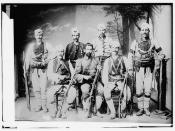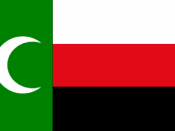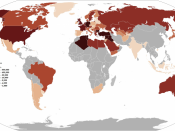Deportation of Meskhetian Turks
The Meskhetian Turks are the people who used to live in a place called Meskhetia, a part of southern Georgia which borders with Turkey. Meskhetian Turks are Turkish-speaking people because Meskhetian territory and population used to be a part of the Ottoman Empire. However, after the collapse of the Ottoman Empire, Meskhetia ceded to the Russian Empire and then became a part of the Soviet Union. In 1944 during the Second World War, Soviet government decided to deport all Meskhetian Turks from southern Georgia to Central Asia. "They must be deported" said the leader of Soviet Union, Joseph Stalin. Thus, Meskhetian Turks became a victim of demographical engineering which was popular in that period. They have a long history of suffering. The deportation of Meskhetian Turks had its own reasons and consequences.
The deportation had a huge negative impact for the Meskhetian Turks.
One of the most terrible effects is that approximately 15- 20 per cent of the population perished during the deportation to Central Asia. Moreover, all Meskhetian Turks' possessions were taken from them and given to the Armenians. One Meskhetian Turk community leader remembered the events: "At 4 a.m., four soldiers came into our house and said we had one hour to pack. We were not told where we would be sent. About 120 families were loaded into one freight car. We traveled 18 days and nights to Central Asia. Many died of typhoid. At each stop they would unload the dead". Thus many thousands of Meskhetian Turks died during the deportation, while more perished because of hunger and cold in their first year of resettlement.
It was very difficult to assimilate on a new land, the Soviet government classified the Meskhetian Turks as the "Enemies of the People", so the local population was hostile to the newcomers until Stalin's death in 1956. The difficulties are also strengthened by the fact that Meskhetian Turks could not speak Russian or any other language of the native people. After the deportation they could work only on fields, growing some vegetables in order to survive. They were excluded from the political arena till the collapse of the Soviet Union. For this reason they could not represent their community's issues on domestic and international level. However after the Soviet Union disintegrated, Meskhetian Turks gained the opportunity to represent their views to the international community. As a result in 1999, Georgian government agreed to develop a program in order to alleviate the repatriation process for the Meskhetian Turks. It seems paradoxically but the southern Georgia also suffered due to deportation of Meskhetian Turks. The prosperous land of Meskhetia was the bridge between Georgian and Turkish merchants. However after the deportation of Meskhetian Turks, this region was abandoned, economical development based on a trade no more existed. Moreover the Meskhetian Turks were the brilliant farmers so after the deportation of Meskhetian Turks agricultural sector was also dead. The act of deportation was a tragedy for the Meskhetian Turks, which had devastating consequences that are actual nowadays.
The specific reasons behind Stalin's deportation of Meskhetian Turks are unexplained yet. However there are few versions about the reasons behind deportation.
There is an official version of the Soviet government. The official Soviet justification followed the pretexts given for the deportation of Chechens, Crimean Tatars, Ingush, and other peoples-that they had collaborated with Hitler�.However this reason is dubitable because the German army had never been closer than 100 miles away from Meskhetia. Thus there is another reason for being deported from the motherland.
The Meskhetian Turks themselves consider their Turkish roots as a reason for deportation from southern Georgia. Since they had strong ethnic ties with Turkey, the Soviet government saw them as a threat for the security and order in Meskhetian region. Actually they were right, The Meskhetian Turks were proud that they were the part of the great Ottoman Empire, and in case of conflict between Soviet Union and Turkey, they would fight on Turkey's side. As one Meskhetian Turk said: "For years we couldn't return to Meskhetia. They sent us from one place to another. They looked down on the Turks. 'You are a Turk, you can't do this, you can't do that, you can't have this job, this position, come later!' These are how they talked to us. I'm a Turk, yes. I came here (Turkey) because it is my motherland. We have not been given citizenship yet. But I am proudly saying that the flag is mine, the land is mine. This land belongs to me, I belong to this land". Thus the Turkish origin is the main reason of deportation of Meskhetian Turks. For this reason they have been deported and Georgian government is oppose to return of the Meskhetian Turks.
The Meskhetian Turk issue has gained an international character, and the role of states and international organizations is very important in order to find durable solutions for this issue. On the other hand the big powers can use this issue in their own interests. The deportation was a tragedy for the Meskhetian community. Nevertheless it was useful in sense that due to deportation Meskhetian Turks have developed survival skills that are serving them nowadays. As a Philadelphia service provider noted about Meskhetian Turks, "They are used to dealing with hardship and are very disciplined. These qualities will help them succeed here." Moreover the experience of deportation helped the Meskhetian Turks develop an identity as separate and distinct people.� The deportation of the Meskhetian Turks is a significant example of demographical engineering indicating that big powers can do everything in order to gain their interest.
� Aysegul Aydingun, Meskhetian Turks An Introduction to their History, Culture and Resettlement Experiences, Washington, CAL,2006. p. 6
� Ibid.,p.7


